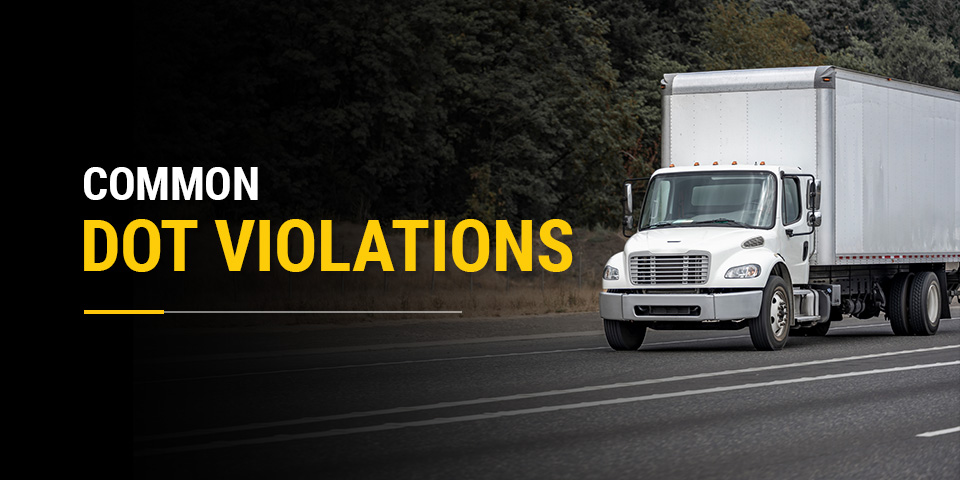

The Department of Transportation (DOT) is committed to ensuring trucking companies remain safe and in compliance while operating. Whether you’re a fleet manager, business owner, commercial truck operator, or commercial truck mechanic, it’s more important than ever before to be aware of Department of Transportation violations (DOT) violations and common reasons you could fail an inspection.
When you get a DOT violation, you face financial penalties, including fines, out-of-service orders, or repair costs. Depending on the severity, you could also face suspension or jail time.
A DOT violation directly increases your CSA Scores and ISS-D Scores, which leads to more frequent inspections, audits, and violations—creating a cycle that’s hard to escape.
Repeated DOT violations can result in license suspension or revocation, permanent record damage, and serious harm to your business reputation. These violations follow you throughout your career and make it harder to attract clients and maintain competitive rates.
DOT violations can usually be categorized as either driver-related or vehicle-related. To help you remain in compliance, here is a list of common DOT violations to be aware of:
Do DOT violations go on your record? If you receive a DOT violation, it will go on your record. Depending on the severity of the violation, the time frame for how long it will remain on your record can vary. Anyone can perform a DOT violations search with the trucking company’s name or DOT number.
There are ways to potentially remove violations from your record though. To do so, you will need to be able to show documentation that you were in compliance with regulations or prove that the violation was issued in error.
Out-of-service criteria is used to determine whether or not a vehicle has met the pass-fail criteria for inspections. This criteria identifies any critical out of service dot violations that need to be corrected so the driver and vehicle can continue operating as usual.
A list of common out-of-service violations includes:
A check engine light itself is not a DOT violation, but the underlying issue triggering it could be—especially if it’s related to emissions, engine performance, or brake systems. During a DOT inspection, inspectors may cite you for violations if they discover the problem causing the warning light. The best approach is to address any check engine light immediately with diagnostic testing and maintenance to avoid compliance issues and out-of-service violations.
The Inspection Selection System (ISS) score is used to determine whether or not a truck should be inspected. ISS scores can range from 1 to 100, with a score of 1 being the best you can obtain. In general, if the ISS score is over 75, you can expect both the truck and driver to receive a full inspection. If the score is less than this, there is still a possibility the truck will need to be inspected.
These scores are calculated based on the Behavior Analysis and Safety Improvement Category (BASICs). Several factors can influence the ISS inspection value, ranging from vehicle maintenance to hours of service. Unlike DOT violations, ISS scores aren’t public information. Instead, the purpose of these scores is to provide a quick and easy method for determining if a vehicle should be rarely, occasionally, or always inspected.
One of the most effective ways for commercial truck drivers to avoid violations is to keep up with DOT inspections. Ideally, you want to have a checklist for both the pre- and post-trip to ensure each vehicle is kept in optimal conditions at all times. Along with helping reduce the chances of accidents or downtime caused by repairs, these inspections are crucial in maintaining road safety and compliance.
All drivers and fleet managers should be thoroughly trained on how to perform these inspections. They should understand how to identify and report any potential issues and how to conduct compliance audits to make sure that all vehicles are meeting DOT standards.
Any time maintenance or repair work is done, you want to keep detailed records of everything. For easier tracking, you can incorporate technology like fleet management software to keep everyone updated and be able to more easily identify issues or trends.
At Thompson Truck Source, our team of highly-trained technicians is here to make sure your medium- and heavy-duty trucks and domestic diesel vehicles are inspected, maintained, and adhere to Alabama Department of Transportation (ALDOT) or Florida Department of Transportation (FDOT) regulations.
We are just as committed to safety and compliance as you are, which is why we’ll keep you informed throughout the entire inspection process. Our technicians can provide you with a variety of services, including:
If you’re interested in learning more about how we can service your truck or entire fleet in a timely, safe manner, we invite you to contact us today so we can help keep you on the road.